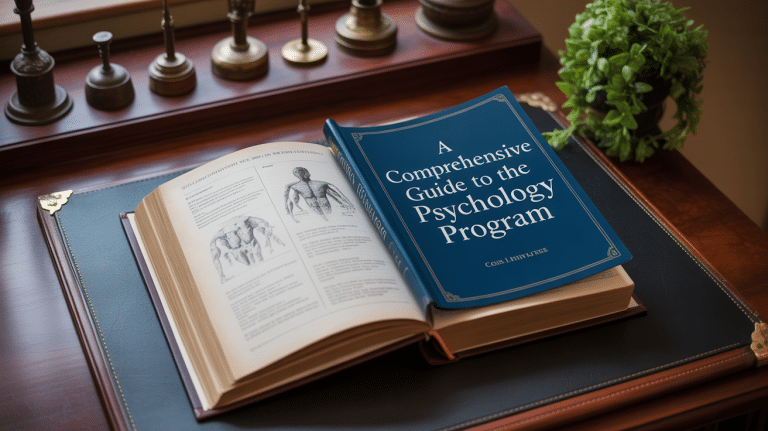A Comprehensive Guide to the Psychology Program
What is Psychology?
Psychology is the scientific study of the mind and behavior. It encompasses various subfields, including clinical psychology, cognitive psychology, developmental psychology, social psychology, and neuropsychology, among others. By understanding human thoughts, emotions, and actions, psychology offers valuable insights applicable in numerous contexts, including healthcare, education, business, and social services.
The psychology program typically spans three to four years at the undergraduate level, culminating in a Bachelor of Arts (BA) or Bachelor of Science (BS). Students delve deeply into theoretical frameworks, research methodologies, and ethical considerations essential for understanding and applying psychological principles.
What Do You Study in Psychology?
Core Courses
- Introduction to Psychology: An overview of psychology as a discipline, exploring major theories and principles.
- Developmental Psychology: Examines human development from infancy through old age, including cognitive, emotional, and social changes.
- Social Psychology: Investigates how individuals’ thoughts, feelings, and behaviors are influenced by the presence and actions of others.
- Abnormal Psychology: Focuses on psychological disorders, including their classifications, etiology, and treatment approaches.
- Research Methods in Psychology: Provides students with the necessary skills to design and conduct psychological research responsibly.
Elective Courses
- Cognitive Psychology: Explores mental processes such as perception, memory, reasoning, and language.
- Industrial-Organizational Psychology: Applies psychological principles to workplace environments and issues.
- Health Psychology: Investigates the psychological aspects of health, illness, and healthcare practices.
- Neuropsychology: Examines the relationship between brain function and behavior, including topics such as brain injury and neurological disorders.
Labs, Workshops, and Internships
Many psychology programs integrate experiential learning components, enhancing practical skills and real-world application. Opportunities may include:
- Laboratory Work: Students may engage in laboratory-based research projects, assisting with data collection and analysis.
- Workshops: Interactive workshops often cover various topics, including therapeutic techniques, assessing psychological constructs, or ethical research practices.
- Internships: Practical experiences in clinical settings, counseling centers, schools, or industrial environments provide valuable hands-on experience, allowing students to apply theoretical knowledge in real-world scenarios.
Careers After Psychology
Graduates with a degree in psychology can pursue diverse career paths, depending on their specialization and additional education. Common career options include:
- Clinical Psychologist: Providing therapy and counseling to clients with mental health disorders.
- Counseling Psychologist: Helping individuals navigate personal, social, and academic challenges.
- Industrial-Organizational Psychologist: Focusing on workplace behavior and enhancing employee satisfaction and productivity.
- Researcher: Conducting studies and investigations into various psychological facets, often within academic or private research institutions.
- Human Resources Specialist: Utilizing psychological principles in workforce management, recruitment, and employee relations.
Sample Job Titles and Average Salaries
- Clinical Psychologist: $70,000 USD / €60,000 EUR
- Counseling Psychologist: $65,000 USD / €55,000 EUR
- Industrial-Organizational Psychologist: $85,000 USD / €70,000 EUR
- Research Scientist: $75,000 USD / €63,000 EUR
- Human Resources Manager: $80,000 USD / €67,000 EUR
Salaries can vary significantly based on geographic location, sector, level of education, and years of experience.
Is Psychology Hard to Study?
Studying psychology can present challenges, but with appropriate preparation and effort, students can succeed in this rewarding field. Common challenges include:
- Conceptual Complexity: Understanding abstract theories and the vast array of psychological concepts can be daunting.
- Research Methodology: Grasping statistical analyses and research design requires time and dedication.
- Emotional Loading: Engaging with sensitive subjects, such as mental health issues, may demand emotional resilience from students.
Required Skills
- Analytical Skills: Ability to interpret psychological research and apply findings.
- Critical Thinking: Evaluating evidence and arguments objectively.
- Communication Skills: Effectively articulating thoughts and ideas, both verbally and written.
- Empathy and Compassion: Understanding and connecting with the experiences of others.
Preparation Tips
- Stay Organized: Maintaining a structured study schedule can help manage the breadth of material.
- Engage with Resources: Utilize textbooks, academic journals, online courses, and lectures to deepen understanding.
- Practice Self-Care: Engage in techniques to manage stress and anxiety, ensuring emotional well-being.
Top Certifications After Psychology Graduation
Graduates aiming to practice as psychologists typically need specific certifications or licenses. Common requirements may include:
- Licensed Professional Counselor (LPC): Requires passing a national exam and meeting various educational and clinical experience criteria.
- Licensed Psychologist: Typically involves obtaining a doctorate degree, completing supervised hours, and passing licensing exams.
- Certified Clinical Psychologist: May involve additional certification beyond state licensure to demonstrate expertise in specific clinical areas.
An advanced degree and supervised experience may be necessary for more specialized roles, especially in clinical practice or academia.
Where to Study Psychology
Several universities offer esteemed psychology programs, supporting the academic training necessary for a successful career. Some of the leading institutions include:
In conclusion, embarking on the psychology program offers a blend of rigorous academic training, practical experience, and diverse career options. Students gain invaluable insights into human behavior while equipping themselves with crucial skills applicable in various professional sectors.
For personalized assistance in navigating academic options and grasping the psychology program, feel free to reach out to Study in Turkiye for tailored guidance and support.
Take the Next Step with Study in Turkiye
Explore further to understand how you can pursue a degree in psychology and start your journey in this enriching field.



